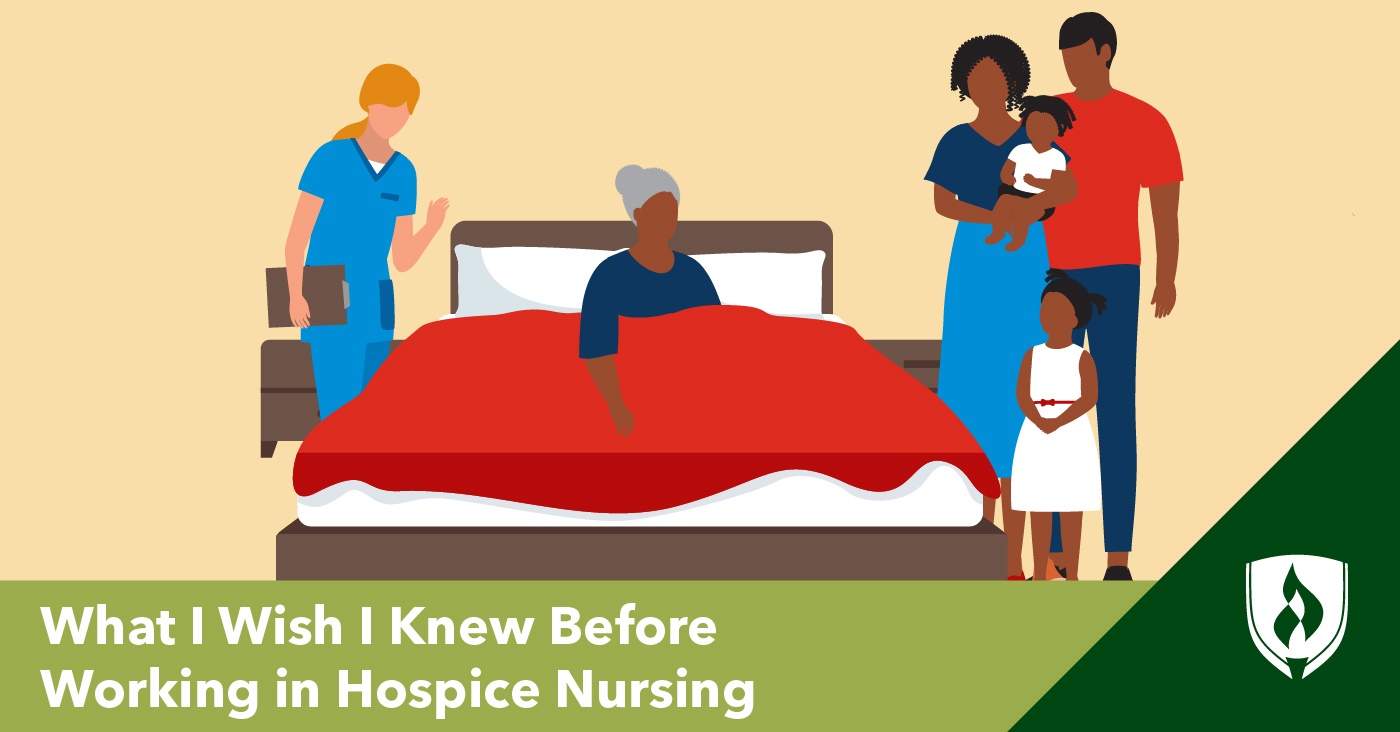When you imagine what your work life as a nurse might look like, your first thought is probably not centered on a scene from a hospice care environment.

This may be because hospice care centers on a situation many people prefer not to think about. Hospice care (also known as palliative care) occurs when a patient is dying, and providers shift their focus from trying to cure an illness to keeping the patient comfortable and helping them enjoy their remaining time.
If you wanted to stop reading after that, you can understand why so many nurses never give hospice care real consideration. But contrary to popular belief, hospice nursing can be an extremely rewarding role—many hospice nurses even consider it to be a fulfilling and beautiful way to work.
“Hospice has misperceptions that it’s a sad or depressing field to work in, however it’s really not true,” says Dr. Becca Gatian, RN and chief clinical officer of Avow® Hospice. “Looking back on my career, I wish I had found hospice sooner. Hospice care is the most rewarding part of nursing I have ever been involved in.”
If you are intrigued by hospice nursing, read on! We asked palliative care nurses to share their points of view on what working in hospice nursing is like from the inside. You might discover that this sometimes-overlooked branch of nursing is exactly what you’ve been looking for.
What you should know before working in hospice nursing
1. Hospice care involves a whole new way of thinking
“Nurses are trained to ‘fix,’ to make people better and diagnose,” says Chastity Fossum, RN and manager of clinical services for St. Croix Hospice®. “In hospice, your mindset should be how to treat the symptoms, not the disease.” Fossum explains that in hospice, you aren’t going to be able to fully heal something that often—but you can reduce pain and prevent infection.
This is the role of palliative care, a branch of medicine focused on managing symptoms and improving someone’s quality of life without trying to stop the underlying causes.
When you’ve spent most of your training learning to cure, it can be a tough mental pivot to accept that patient comfort is often the primary measure of success. “Hospice is symptom management of the disease, not the cure for the disease. I find it hard for a lot of people to think this way,” Fossum says.
2. You aren’t always working in a medical facility
Hospice care most often happens where the patient lives, according to Melanie Campbell, RN at Trinity Hospice in Austin, TX. She explains that many people in and outside of healthcare assume “hospice” is a location of some kind, but hospice care under the Medicare benefit can happen wherever the patient resides.
Hospice care routinely takes place in the home, nursing homes, personal care homes and other facilities like hospitals, outreaches for the homeless and anywhere the patient who needs hospice is located. Depending on your work arrangement, this can make your typical workday very different from the nurses who check into the same facility every day.
3. People might respond strangely to your career
If you go into hospice nursing, you’ll soon realize that those who know what hospice means have inaccurate impressions about the career, according to Dr. Gatian.
“People ask me how I could work in hospice, and I say, ‘How could I not?’ There is a misperception that hospice is always sad and that hospice staff only deal with death constantly.” But Dr. Gatian points out that hospice is actually full of life—in fact, it’s one of the few branches of healthcare where quality of life is the primary focus.
“I have helped patients take their last trip, get married and go to their grandson’s graduation. Hospice is about making the most of the time we have left on earth and enjoying every minute of it,” Dr. Gatian says. But since death is still something of a taboo topic for so many people, she finds herself needing to regularly explain the beauty and dignity of her role.
"I have helped patients take their last trip, get married and go to their grandson’s graduation. Hospice is about making the most of the time we have left on earth and enjoying every minute of it."
4. Hospice nursing is very intimate
“Our clinical staff really gets to know the patients, as we are entering their homes in many cases.” That intimate setting, often involving family members who become part of the care team, really brings you closer to each patient and makes each interaction more personal and connective.
Instead of being surrounded by medical personnel, medical equipment, clinical white and that sterile, chemical hospital smell, you are often in the patient’s home with their personal décor or activities, working with the people who love them most. Since hospice care often involves teaching patient family members how to administer care, your role is extremely relationship-based.
“My favorite thing about working in hospice is the personal and dedicated time that is spent with patients and families,” Dr. Gatian says.
5. It can be challenging to field unrealistic expectations
There are many misunderstandings about what hospice care is and what it isn’t. Campbell explains that sometimes people only begin hospice care when the illness process is very late and families or other caregivers are already fatigued.
“Hospice is meant to support families caring for their own at the end of life, not to do everything for them,” Campbell says. “Often, caregivers are an elderly spouse, or adult children who are still working. They are often exhausted and burnt out, and they might express frustration that hospice staff does not provide more direct caregiving.” She explains that hospice nursing has specific parameters of coverage through Medicare—which are primarily medical. But patients in hospice typically need far more help than just medical interventions.
While some patients might have access to other caregivers or additional help in certain ways, family members might not be aware that they will administer certain medications, monitor the patient or handle other daily necessities. “This is a big gap in our caregiving system,” Campbell says.
6. You might have young patients as well
Hospice nursing tends to call an elderly population to mind, but hospice can happen for anyone dying of a terminal illness, including young people and children.
“One thing that is challenging for me is watching families grieve, especially when we have a younger patient,” Fossum says. “Those are the toughest for me. I think having a great team to talk with and release some of those emotions is key.”
Dr. Gatian says one of her most memorable days in hospice nursing was when she worked with a child who had dreamed of traveling to Walt Disney World®.
“The team assessed the patient for travel and discussed the options with her mom.” Dr. Gatian says the patient couldn’t make the car ride without experiencing severe symptoms because of her disease, but the care team wouldn’t give up. “They rushed to every store possible and found as many Disney ® items as they could. The next day, the team brought Disney to the child by setting up an enchanted village for her at her home.”
7. You need to be able to work independently
If you prefer a nursing environment with lots of oversight where managers or other healthcare professionals assign your tasks, hospice might not be the right environment for you. This work can be mentally challenging, and hospice nurses need to be able to work independently and make confident assessments according to Fossum.
You will work with a care team, so that kind of collaboration is still important, but nurses in hospice need to be able to handle autonomy well.
8. Your patient is truly the whole family unit
If you are noticing the word “family” pop up over and over again, it’s because a patient’s loved ones play a huge part in hospice care.
“I love when we get to know the patient and the families and listen to their stories. You really get to bond with them,” Fossum says. She loves asking about the hobbies, work life and passions of her patients to see their families open up and share stories. “The patient is not your only concern—you are caring for the entire family as one unit.”
These last moments together are probably memories that family members will carry for the rest of their lives, and hospice nurses get to facilitate so much meaning and joy into those memories. Dr. Gatian recalls a patient’s son who really wanted to spend one last baseball game with his dad. Due to the illness, they hadn’t been able to go to a game together for a long while, but when hospice care began, Dr. Gatian helped coordinate a day out.
“We ordered medications for symptoms he might experience in the car ride or at the game and ensured that the son knew what to administer.” Dr. Gatian says they chose an evening game out of the hot sun, ordered a foldable wheelchair and packed oxygen the pair could use for several hours. “Dad and son got to experience a special last day together that would not have otherwise happened if it weren’t for the support of the hospice team.”
Is hospice nursing for you?
A career in hospice isn’t for everyone, but if these inside looks at life as a hospice nurse appealed to you, maybe this nursing role is something you should further consider.
“When a patient’s family tells you that you helped make their loved one’s passing so special for them, that is the satisfaction you get from hospice care that is unlike any other nursing field,” Dr. Gatian says.
The first step towards this fulfilling career is to become a nurse. Check out How to Become a Nurse: A Beginner’s Guide for a clear overview of what that journey involves.
If you aren’t so sure about hospice nursing, you might be interested to see some of the other specific and interesting nursing roles out there. Check out, “9 Unique Types of Registered Nurses Who Make a Difference Every Shift.”
Avow is a registered trademark of Avow Hospice, Inc.
St. Croix Hospice is a registered trademark of St. Croix Hospice, LLC.
Walt Disney World and Disney are registered trademarks of Disney Enterprises, Inc.




